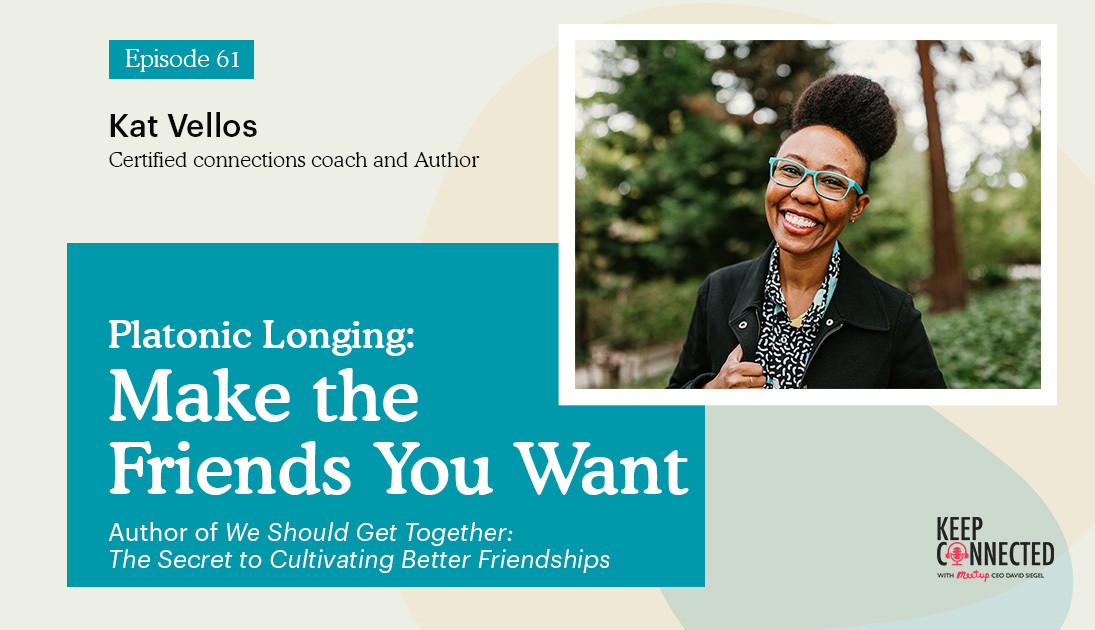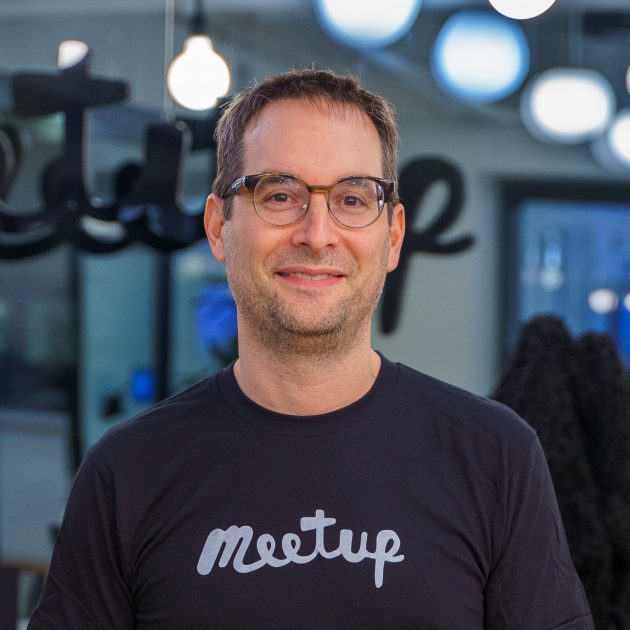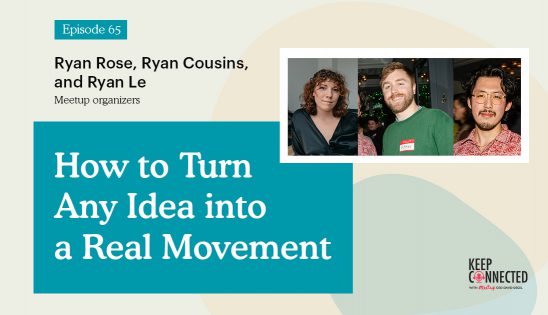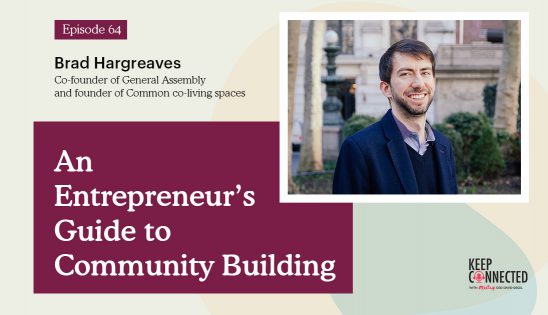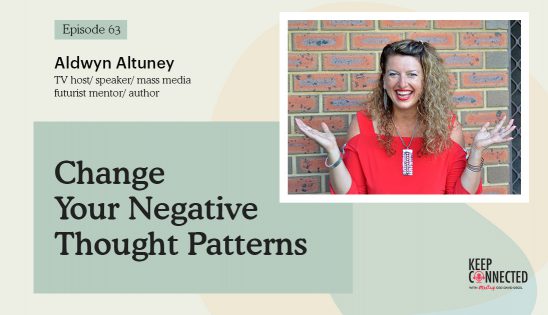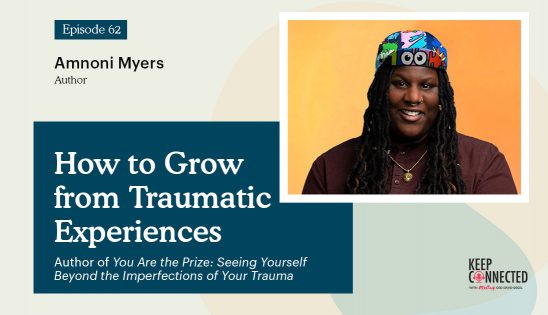Kat Vellos is a certified connections coach and the author (plus illustrator!) of We Should Get Together: The Secret to Cultivating Better Friendships. She and David sit down to discuss why platonic relationships between adults are so important, why they’ve become difficult to maintain in the modern social landscape, and how to buck that trend through intentionality. Their conversation includes everything from the growing fear of awkwardness and online parasocial relationships to original ideas for replacing the old small talk and overlaying friend time with your other commitments.
Show Notes
In this episode, we are talking to Kat Vellos. She is an amazing speaker, facilitator, connections coach, and author of the award-winning, We Should Get Together: The Secret to Cultivating Better Friendships. Amazing person. Many positive tangible actions that you could take to be a better friend and to grow your adult friendships.
—
Kat, welcome to the show.
Thank you so much for having me here. I’m so excited to be here with you.
You’re an adult friendship expert, certified connection coach, author of We Should Get Together, and also a very successful Meetup organizer. Let’s start with you. User experience designers, Pandora and Slack, do not typically become sought-after adult friendship experts, but you did. How in the world did that happen?
By using the exact same skillset that I used as a user experience researcher and designer. Research, inquiry, and design thinking are the exact same things. You can use them for anything. Instead of saying, “I can only use these skills to make apps and websites more usable,” I was like, “What if I use the exact same skills to solve a problem I observe in the real world? That is, adult friendship is way too freaking hard, too many people struggle with it, and it doesn’t need to be that way.” I use those exact same skills to answer the question, “How might we make adult friendship easier?” rather than just, “How might we make it easier to play music or have fun at work collaborating?”
I’ve also been a facilitator for twenty years, so it is not new to me to be attuned to the needs of people who want community and connection, and ways to do that. Combining everything I knew as a facilitator with everything I knew as a user experience, researcher, and designer to say, “Let’s have a better experience of adult friendship. Let’s see how that goes.” That’s how. I spent about five years researching and writing the book. It’s not like I woke up one day and was like, “I know everything about friendship.” I’ve studied this for a long time and I tried to create something useful for people, which is the book so they can have an easier time with it too.
One of the things that I read was that when you first started, you were not writing the book, We Should Get Together. What were you writing originally? Are they stuff for yourself or others?
I was doing user research with people who were struggling with adult friendships and writing up just like I would for any other user research, like a case study. What am I learning? What are the pain points? What are the friction points? What’s working well for people? All of those things that we could learn. I was writing a lot of essays. At one point, I was like, “What am I going to do with these?” I had a blog.
At one point, I was sharing these community interviews I was doing, and then I was like, “It’s fun doing these portraits and these blogs,” but then I was like, “This is too long for a blog post. This is too long for a medium post.” It was getting longer. After about 10,000 words, a friend was like, “It sounds like you’re writing a book.” I was like, “Am I writing a book?” She’s like, “Yeah, maybe you have a book in you.” I was like, “I do.” It’s lovely because when you don’t know you’re writing a book, you never have to open a blank Google Doc and stare at the screen sweating like, “What am I going to say?” It’s like you’re already 25% done. Just finish.
Were you personally a good adult friend? Were you not great at building adult friendships? Talk about that a little bit.
I never had any trouble making friends before I moved to the Bay Area. I will not say that I necessarily had trouble making friends in terms of meeting people, having a nice conversation saying, “I’d love to stay in touch with you.” That’s not hard for me. I’m an introvert, but I’m not shy. I like people. I just need lots of recharge time after being with people. That’s my introverted part. The difficulty that I observed in my life was, especially once I got into my 30s, keeping people around was getting much harder. There was one year living here in the Bay where I went to more going away parties than birthday parties. People were moving all the time.
It’s so transient.
That made it hard. I got to start over. I got to make a new friend because my friends keep moving away and I’m trying to stay here. That was a big part of it. I also found that for a lot of the people I was interviewing, it’s not that they had trouble being friends. It was the keeping and feeling the sense of continuity, getting as close as you want, not just having small talk all the time. The quality, depth, and continuation of high-quality friendships were the trouble. It’s not meeting people. Meeting people is easy. Keeping and making strong friends is different.
Meeting people is easy. Keeping and making strong friends is different.
It’s similar to when you’re running a company. Getting new customers is not easy, but less difficult than keeping those customers engaged, going, returning, and referring people to go back to you. It’s a similar kind of thing. You don’t want to be this “leaky bucket of friendship.” You got this great bucket, lots of friends coming in, but it’s all leaky, and they keep moving and leaving. That’s never healthy. It sounds like there’d probably be very different strategies that people may need to take to keep in touch with remote friends who have moved out to different cities than ones in the same city.
I think they’re different levels of effort, attention, and intention. It’s something I talk about a lot in the book. What’s your intention? What are you going for here? Realizing that you might need different strategies for different situations.
I was just in Israel, which was great. I’ve been to Israel because I have 2 of my 3 there right now. I go to Israel every six months. There are people whom I will see more often in Israel because every time I come in, I have my list of 7 or 8 people I’m going to always reach out to. They could be 15 to 20 minutes away and I’ll see them every couple of years, but because I travel to a place, I’ll make the intention of always trying to get together with them. That’s unfortunate because I should make just as much of a level of effort for my close friends who are nearby as I do when I happen to be visiting the city. That’s a challenge for me.
That’s part of human nature. We tend to take things for granted when we feel like we’ll always have access to it. When something feels special, rare, and novel, we’re like, “Of course, I’m going to make that a priority.”
I love the term platonic longing. I have never heard of the term before. Longing is an interesting one because it implies this emotional anguish type of experience. Talk to us about platonic longing.
This was a term I coined in the book because it was the most succinct way to describe this exact experience that I was hearing from a lot of the people I was interviewing. It was this longing and craving for a certain type of relationship that was missing in their life, and it wasn’t romance. We talk about longing typically in the romantic sense, but what they were craving was platonic. It’s that friendship longing, that craving, that unmet need, that hunger for, “I want these deep close platonic relationships and I don’t know how to get them. I don’t know how to make them. It’s hard.”
It is important for us to have words to describe the experiences that we have as human beings. Without a name for it, it almost increases the suffering. It increases the pain of it when you don’t even have a name for it, which is similar to why it’s hard when people are dealing with a medical or physical illness, but have no name for it. There’s no diagnosis. It is so hard. It makes you feel like, “Am I the only one who feels like this? Naming it and saying, “This is platonic longing. This is what it is. You are not alone. This is what it feels like,” it is real. You deserve to have that need.
What you said is so important because one of the greatest sources of pain and sadness for people is the feeling that you’re not going to get out of it. The reason why you’re not going to get out of it is because you’re unique. It’s a unique situation that you’re facing. The world’s a big place. People aren’t as public about their challenges. They’re very public on social about the wonderful things going on in their life. They’re not as public about their challenges. Though, increasingly they’re more so.
Naming something allows you to talk about it very effectively with other people and have people say, “I feel the same way.” That’s incredibly important. Let’s talk about the four big challenges that you’ve written about around adult friendships. I’m asking for this because I think so many people will be able to identify it with multiple of those challenges.
For anyone who’s tuning in, make a note for yourself if you think this is something you might be dealing with. It’s real. It’s a thing. It’s not just you. The first one is what I call hypermobility in the book. This is a good example of this is how I described it. I went to more going away parties than birthday parties in a year because people keep moving.
People move at a faster rate. Whether it’s in and out of jobs, cities, apartments, neighborhoods states, and countries even. People always being on the go. Including this are people who talked about having long commutes. We had a lot of that before the pandemic, not so much during the pandemic, but now it’s back. If you have to commute two hours a day to somewhere, that’s the time you don’t have for friends. Hypermobility is the first one.
The second is busyness. Feeling generally not having enough time to connect with friends even though you want to, not having enough space in your calendar. The third challenge is relationships and family. That doesn’t mean that relationships and family are a bad thing, but it is a real commitment of time and attention. Often in our society, these relationships are rated at a higher priority than making time for your friends. When you’re committed to getting into your first grownup, real-life, serious, deep relationship, or you’re having a newborn, your ability to spend time with friends is going to shrink.
The fourth challenge is what I call difficulty establishing intimacy. This is what I’m talking about. It’s easy to meet people, but then how do you go from a stranger to a best friend? How do you get a crew of ride-or-die homies? How does that happen if you’re just talking about the weather and getting coffee every 72 days? Is that going to be enough momentum to establish the depth, trust, intimacy, vulnerability, reliability, and all of the things that go into having a committed friendship? Those are the four big challenges. I don’t know. Do you identify with any of those, David?
I identify with probably all of them, but the one in particular that resonates for me is, I tend to believe that “focus drives success.” Just because family is so important, I have three kids, it’s very easy to become overly binary and be 100% to 0% type of thing in terms of family versus friends. When you’re too extreme, generally in life and pretty much anything, almost always, it’s not a good thing. It doesn’t have to be 50/50 or 80/20, it could be 90/10, but it shouldn’t be zero. There was a period in my life where I was like, “I can’t deal with any friends right now. I’m overwhelmed. I got a 1, 3, and 7-year-old. I’m dying.” You still could find some time, so that one particularly resonated for me.
Sometimes when we think we don’t have time for friends, it’s because we are believing something we don’t need to believe. For example, there’s a thing that often happens in adulthood where we put the time in our calendar to see our friends in a box that’s separate from the rest of our life. That’s a behavior that we don’t have to believe that time with friends must happen in a box separate from the rest of our life.

What happens if that box is translucent, transparent, or laid over the top of something else that is already a part of your life? It’s like spending time with your kids. You have to get groceries. I have to get groceries. What if we went to the grocery store together? We can overlay the adult responsibilities and commitments that we have with our friendships. We don’t always have to compartmentalize everything and keep it separate, and then feel like we don’t have time for it.
I like that. I enjoy running a lot. A bunch of friends and I all run together. It’s very efficient to be able to run, exercise, and also maintain those friendships together at the exact same time. I remember I did this with shopping and kids. I had time for my young kids. At one point in time, I had to shop, so I would take my kids with me for shopping. You can take friends with you for shopping.
Finding ways to almost go through as many tasks as you can and see how you could do some of those with friends could make it an even more wonderful experience. It’s a beautiful idea. You had so many different things in the book. I’m going to go with the first one that hit me, and then you’ll hopefully add some more. Social media unshare, I like that concept because I had never heard of it before. Explain what it is, and then what should we be doing.
This is a concept also that I came up with and gave a name to in the book because one of the things I write about in the book is parasocial relationships and how social media can sometimes create parasocial relationships between friends. Simply by observing each other’s lives, we think we’re close, but we’re not interacting at all.
The social media unshare is a way to say, “How might we disrupt a social media behavior just a little bit so that it gets us a little bit closer to the friends that we want in our life?” One version of it is to say, if you took a beautiful photo during your day, or something funny happened, or something interesting happened. You would typically post it on social media.
Instead of posting on social media, pause and think, “Who might the 1, 2, or 3 people that I know appreciate this the most? Let me send it to them directly.” Let me send it to them either as a personal message, a text message, an email, a voice memo, or whatever it might be. You’re like, “This thing happened. I would love to share it with you. Check this out.”
See what happens if you have a one-to-one relationship or one-to-one communication around that, or with a small group. The thinking behind this is, if the thing that you’re sharing is good enough to share with many people or everybody who follows you, then why isn’t it good enough to share directly with the people who are the highest impact on receiving?
Before you go to the next one if you send a message of something like, “I’m just thinking of you.” When I get those from people, I’m like, “They were thinking of me, little old me? I feel so special. I haven’t spoken to them in six months. Thank you for thinking of me.” It’s so meaningful to get those. I like what you said. It’s all about intentionality. These things don’t take a lot of time.
It doesn’t. Another way to do this is if you see that a friend has shared something on social media, instead of writing a little comment underneath or dropping your emojis, thumbs up, heart, and moving on, follow up with them directly to ask a follow-up question, get a little bit behind the scenes, or to say, “I would love to hear about your trip to Turkey. Do you want to tell me about it? I have time this weekend all Saturday morning.” See if you can take it deeper than just a comment on social media. See if you can create a moment of connection for yourself and that friend with a conversation.
When I first launched my show, I interviewed someone. A person whom I barely ever talked to, a wonderful person I haven’t stayed in touch with, out of the blue called me up and said, “I tuned in to your show. I want you to know I loved it.” There might have been other people that maybe liked the post or whatever it is, but to call up and say, “It was so great for the following reasons, 1, 2, 3.” I felt so happy and it felt so special. That story reinvigorated our relationship.
We started talking, and now we talk more often. He made that first effort of reaching out, rather than just shooting a note to call me or hitting a like button. It had an impact on me. I try to do it more often, which is very easy since I did it zero before, so more often is like once in a lifetime. Those are two extremely practical actions that people can take, and so much of it involves that pause.
It’s the pausing, the thinking, and as you mentioned, making the other person feel special, seen, thought of, and noticed. Being like, “I thought of you. I want to connect with you about this specific thing.” Thank you. It’s beautiful.
The next one that I also liked and it’s related to is the phone dependency issue and how people can decrease their phone dependency. Riff on that a little bit vis-a-vis friendship, please.
This came up in the chapter about getting past awkwardness, which is so relatable for so many people. They’re like, “I don’t want to have an awkward conversation.”
Let’s do the awkward thing. I got a 15-year-old daughter. She and her friends, every time I hear them talking, they’re, “Awkward this, awkward that. This is awkward.” How has awkwardness become such a big thing in this world?
I don’t know.
Everyone’s so afraid of awkwardness. Why? What’s so bad about awkwardness?
There are a lot of different reasons, but I think part of it is that there’s a little bit of fear underneath this. I interviewed a therapist in this chapter about the awkwardness to talk about this. Part of it is a little bit of fear of, “What will happen if I don’t know what to say or do?” You will survive. You will figure out what to say or do.
Why is it such a bigger phenomenon today than it was years ago?
It’s because we spend so much of our life not improvising. We spend so much of our life having the opportunity to draft what we’re going to text before we text it. Write out what we’re going to say before we say it. We have fewer options to spontaneously improvise and discover that it will be okay if you need to spontaneously improvise in a phone call, in a conversation, in a social situation, whatever it might be.

The more that we rely on devices to mediate, create a barrier, create a buffer, create a zone of practice, even a zone of delay and procrastination, there is safety and comfort there. That’s part of the phone dependency. I believe that is also part of the awkwardness in this game as well, from the therapist I interviewed who said he hears this over and over with his clients. People are afraid of awkwardness.
We talk about the exposure hierarchy and we talk about ways to reduce your fear of awkwardness. In little baby steps, give yourself a chance to try the thing that seems like it’s going to be awkward. When you discover that you survived and it’s okay, you get a little bit stronger. Just like lifting weights. You start with a low weight, then you move up to a higher one. Eventually, you discover that you can do something you didn’t think you could do before.
The analogy I typically like with the weights is that the way in which your muscles increase is by tearing your muscles. Little muscle fibers are tearing, they’re in pain, and then they come back stronger every single time. It’s that practice that’s so important. First of all, super interesting. I never heard that theory before and I totally buy it around why awkwardness is such a more meaningful phenomenon. It has to do with spontaneity and the ability to do something quickly and to practice around that. More people should be taking acting classes. That might help.
Improv is a wonderful tool to get over the fear.
Every teenager should be taking improv. Let’s go back to phone dependency.
Part of this is related to that. If someone’s dealing with awkwardness and it’s related to this phone dependency, realizing like, “I noticed that I’d rather type out everything rather than speak extemporaneously at the moment.” Practicing that more frequently can be great, even if it’s in a small way. Chatting with your barista, chatting with the person at the grocery store, chatting with a neighbor on the street who has a cute dog. See if you can build up those muscles. With friends, try to get into more real-time conversations instead of always communicating via your device.
The device I believe is there as a bridge to help you get closer to that real-time conversation. Same thing with apps where you can meet people, like Meetup. The device is there to help you see like, “You both want to meet. You both have something in common. You want to connect. Now, get off the device and hang out.” Now, with COVID for the last few years, we’ve had a lot of virtual events. I do a lot of virtual events. I get it. The point is to get into a real-time interaction, not to spend time chatting and hypothetically you getting together one day. No, really do it. Do the thing.
Two thoughts. One is, Meetup’s mantra, “We use technology to get people off of technology,” which is exactly what you said that I love. The second is, more people I’m talking to, and they’ll say something like, “We were chatting.” Chatting used to be talking, but now chatting could be texting. Somehow chatting includes texting and they haven’t talked, but they consider that fully chatting.
Identifying quality connections versus less quality. Also, you wrote about it in your book. It’s hard. You don’t want to put people on some high-low hierarchy because it’s not about the person. It’s about the connection. Talk a little bit about what is a high-quality connection, what’s a low-quality connection. How do we identify? How do we move from low quality to high quality? I know that’s a great concept in your book. Please share as well.
This is very personal. There isn’t one answer for everybody because what I think is a high-quality connection and what you think is a high-quality connection might be different. That might be a place of friction or frustration in a friendship if we are matched, but we’re not very well matched because we have different ideas of what we’re each looking for. It’s like dating. Somebody might consider a high-quality connection in a dating situation to be different from somebody else.
In a friendship, it’s very much the same. It requires some self-reflection to say, “What are the experiences that you have in a friendship that allow you to feel seen, heard, alive, inspired, and connected? What are the things that you also want to commit to your friendships and hope to receive? Is it being there for each other in a time of need? Is it helping each other out with life stuff or helping each other out with career stuff?”
Being clear with yourself about what you would define as a high-quality connection, and then how can you be more clear with yourself and with others as you try to cultivate those relationships? How can you put yourself in these environments or with groups where that type of connection is more likely to occur so that you make it easier for yourself?
You turned the tables on me, so now I get to turn the tables back on you on this one. For you, what does a high-quality connection look like?
Personally, a high-quality friend connection looks like a high degree of willingness to have open-hearted conversations. That is a big one. People who want to go to new places in the conversational landscape. We’re not going to walk down the same seven streets with the same seven questions every time. We’re going to switch it up and try new things.
A high-quality friend connection looks like a high degree of willingness to have open-hearted conversations.
Let’s talk about the weather.
It’s important. It’s a part of life. The reason I made the Better Conversations Calendar is so we could have 300 alternatives to our most common small talk questions. Let’s talk about something new. Let’s play. Let’s experiment with that. Also, sometimes it’s play and sometimes it’s deep in sharing hard stuff. I don’t think this is unique to me, but I think people want to have stuff in common. Whether it’s stuff in common from your life experiences, your identity, the kind of work or things that you think about, or the kinds of hobbies that you like. We get along well with the birds that we’re of a feather with. Those are things that feel like high-quality connections.
Something else I’ve noticed particularly as I’m getting older is, flexibility is part of a high-quality connection for me. I’ve become more flexible with my friends and I want my friends to also be flexible too. I’m not the kind of person who’s going to get mad if you need to reschedule or cancel. I also hope that if life stuff happens, somebody’s not going to hold a grudge against me for six months if I need to reschedule or cancel. Life is too short to be upset about stuff like that. That’s part of a high-quality connection to me. It’s forgiveness and flexibility and being like, “Cool. Life is happening. I trust I will see you again. I trust we still like each other, so I’m not even going to stress about that.”
I’m thinking of someone that I’m close with. Their priority for high-quality friendship is someone who will be there for them in challenging times. For me, I don’t want people to be there for challenging times. It’s fine to have that. It’s wonderful to have that, but for me, I’d rather have people I can have fun and meaningful life experiences, grow, and do things together.
I have enough of a small core group of people that I could go to for challenging times. I don’t want each of my conversations to be, “What’s your challenge?” and spend our time talking about challenges. That doesn’t make me feel closer. It’s the doing of the things that makes me tend to feel closer. It’s about knowing what works for you. I’m different than most people, and that’s okay too.
That’s okay. This is exactly what we’re talking about. It’s different for different people.
You mentioned 300-plus different topics. I have to ask because you mentioned it. Don’t say all 300 or else we’ll go for a little longer than usual. Just give me 1 or 2.
In the Better Conversations Calendar, one of the pages is alternatives to what’s new. I have two that are pretty light, and then I’ll share one that’s a little bit deeper, maybe not the meaning of life deep, but okay. Two that are new but specific are, “Tell me about a good meal that you had lately, and also what kinds of stuff have you been googling lately?” That will tell you a lot about what’s new and relevant in someone’s life and where their mind has been. It tells you a lot about what might not otherwise come up. One that’s a little bit deeper is, “What’s an idea that you’ve walked away from that you want to revive? How do you feel about the stuff you own?”
I should throw away half of it, probably. There’s way too much stuff in my life. Talk about some activities, like relationship building that you would suggest.
I talk about this in the book because one of the most interesting pieces of research that I found and got so excited about had to do with a study that showed that, when we do novel experiences with people that we don’t know that well, it bonds us much more quickly than doing a state or a run-of-the-mill generic experience.
That’s because when we’re in an extraordinary situation, we are distracted from our feelings of awkwardness and we are mutually side-to-side looking and observing this extraordinary experience rather than looking at each other and feeling awkward and nervous. Novelty is like the inoculation against awkwardness. It gives you a shared memory and it gives you something to do, look at, or speak about together at that moment. Novelty is something that I think about a lot when you ask this question.
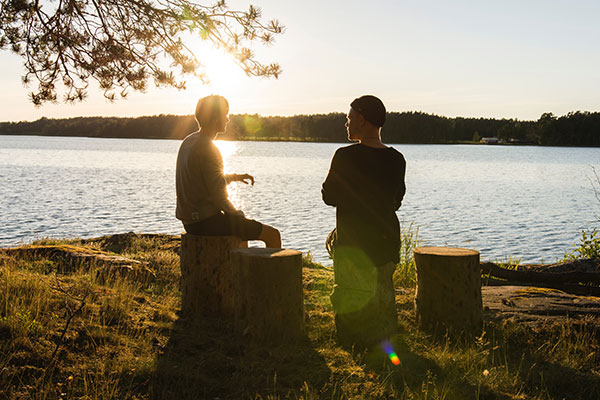
What are some novel things? What’s novelty?
It needs to be novel to each person. If I’m very used to doing improv and you’re not, it’s not going to feel as novel for me, but it’s going to feel super novel for you. Improv is a wonderful experience to do with friends, especially if neither of you is particularly familiar with it because of all of the things it does. It opens up your mind and creativity. It shows you that you can survive an unexpected experience at the moment, it will be okay, no matter what, everyone’s going to clap, and you’re going to move on to the next thing.
That’s how crazy everyone’s actual mind is because you have no time to think, so these crazy wacky things come out. I did an improv with people I didn’t know, and the exact thing happened to me. One of my closest friends now is the one I did an improv thing I barely knew before.
You also laugh together a ton when you do improv. Laughing together is also one of the things that help people bond very quickly together. It’s doing something novel like that. I would also say one of the things, and this takes a little bit more courage, but it was a wonderful strategy that came from the moment I interviewed. She said that when she has a new friend that she wants to cement that bond quickly, she will try to do a mini vacation together, even if it’s just a one-day road trip or, “Let’s get out of town for one night and go see this music or whatever.”
Laughing together is one of the things that help people bond very quickly together.
It creates this time outside of time where neither of you is distracted by your dishes or your errands. You have this concentrated experience of closeness with each other. You have a memory from doing this little mini getaway together. It creates this nice foundation for connecting because then it’s not just like starting over from scratch with another cup of coffee. It’s like you’re starting over from this place of real closeness. You can have so many more conversations that go to a different place when you’re spending 12 hours or 24 hours with somebody than when you’re only hanging out for 1.5 hours.
What’s funny is, I had a conversation the other day with a guy who read the book. He got in touch with me and said, “When I read this thing about spending the weekend with a friend, I’m a guy. A lot of guys aren’t going to do that with their guy friend, but I noticed that with this new guy friend that I made, we hung out Friday night, and then we hung out Saturday night, and then we hung out on Sunday. I didn’t even think about it, but we spent the whole weekend together. We just had breaks in between. We didn’t stay overnight. We just hung out three consecutive days.” I was like, “Awesome. That works too.”
One night, and then one early morning, and you go back. The depth of a friendship that could be built is very strong. I’m happy to say there’s a bunch of guys that I have done that with and it’s deeply meaningful. I got to do that more. I’m super intrigued. Please share a little more about the Connection Club as well.
Connection Club is a group I run. It’s a community for connection geeks. It’s a cross between an accountability group and a community of practice. The people who are in Connection Club are people who want to be intentional about cultivating connection in their life in some way. That looks different for different people. Some folks in the group want to get more comfortable hosting gatherings and hosting a dinner party. That might be something super new for them. For somebody else, it’s like learning to be a facilitator. They want to practice facilitation skills.
It’s very personal whatever your goal is. We meet every month. We go over our accountability and our goals. How did it go last month? What’s up for you next? What’s going to potentially get in the way? What ideas do you need? What support do you need to carry this out? We also have discussion circles in mini-workshops. If there are things that people want to learn more about or discuss in a group, this is a safe closed-door space where you can do that. It’s wonderful. I love it. We have wonderful people in the group because everyone values connection or they would not be there.
The people that are there must be so unique and special because maybe they have challenges with connections, but they have awareness of that and they want to change. They could see other people who share that. They don’t have challenges. They just enjoy making more connections. It must be a special group of people.
It really is. If anybody wants to join, head to my website, WeShouldGetTogether.com. Come on over to Connection Club.
Not just head to the website, but also buy the book.
Yes, and get the book.
Connection Club sounds a little bit like a Meetup, which is great. The more Meetup world, the better. You are a Meetup organizer. Share a little bit about your Meetup experience before we wrap it up.
I’ve been a member of Meetup for so long, definitely over fifteen years. I’ve started and run two Meetups as well. One was called Better than Small Talk, which is something I started before I knew I was writing a book, but I was doing these events and gatherings about connection. Better than Small Talk is one. Also, Bay Area Black Designers, which I started in 2015 and ran every month until 2022.
That was exactly what it sounds like, Bay Area Black Designers. We were designers in the Bay Area who were Black. It was the largest company-agnostic employee research group because we had designers from all over the region, from all different companies who were a professional supportive community for each other, and who felt isolated at work. Those are two of the Meetups that I’ve run. I’ve been to countless others as a guest
We’re so appreciative of your engagement with Meetup, your focus on making the world a better place and helping people to build connections. One of the things we say at Meetup is this. We did a little analysis around this. On average, we build 30 million connections a year between people. Some companies’ KPIs are revenue and profit, etc. Our KPI is the number of connections that we’re able to engender.
It’s the most important thing because when you have connections, hence the name of our show, Keep Connected, it helps do so many very important things, which are decreasing racism in the world, decreasing ignorance in the world, decreasing ages in the world, decreasing all these things. Just because people don’t have exposure to people who are different from them and the support that it’s able to provide.
We’re both doing the same thing, two sides of a coin. I read in your bio that you are a lover of puns. We won’t go into tacos. I have heard you love tacos and you love puns. You love puns about tacos and tacos about puns. You got a pun for us or you can’t do puns spontaneously. It doesn’t where it has to be ad-lib.
I don’t have a favorite pun, but we can taco about it. We could chat about it over lunch, but if they don’t have tacos, I’m walking out the door.
That’s a way to make a lot of friends.
Puns are very polarizing. People either love them or hate them. People who like puns are my people. In fact, one of my goals is to go to the Punderdome or the Pun-Off. There’s this pun competition and I want to do it one ear. I’m going to go. Not to compete, I just want to laugh my face off.
I just thought of something related to puns and something that we just talked about. I get this email every day. It’s called Nice News. I’m tired of the news always being horrible about terrible things. In nice news, one of the things they shared was that stupid dad puns help children specifically to get over awkwardness because they’re in more awkward situations when the “dad” or a friend makes the terrible pun. They’re able to handle awkwardness more often. Apparently, there are actual signs and research behind the value of puns.
I love that. I do love a good dad joke. It’s great.
Rapid fire questions. Quick question, quick answer. Here we go. When was the first time you saw yourself as a leader?
When I started poetry reading after college because I wanted to.
That is possibly the best reason to do something because you have a passion for it. If you could access a time machine and go anywhere in the world, any place, any time, where are you going and when?
Life wasn’t too awesome for Black people in the past, so I’m probably going to go back to when I was 21 because the first year out of college was super fun feeling free and adult for the first time.
What is one thing on your bucket list that you have not done and you would love to do?
I would like to get a massage every day for ten days straight.
That’s great. Aren’t massages wonderful? They’re so healthy.
It’s so great. That’s a thing I’ve never experienced. I don’t know if anybody gets to experience that, but it sounds like it would be amazing. It feels like a bucket list thing.
That’s a great bucket list thing. I’m in.
You can tell I’m a Taurus.
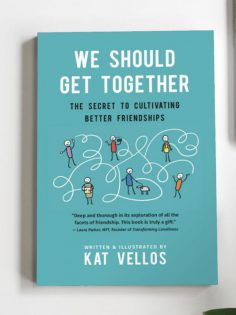
Last one. You’re many years ahead, what do you most want to be remembered by?
The legacy of being a person who champions connection, friendship, and community.
You are definitely that now. You are no doubt going to be remembered by it. We Should Get Together, get the book and learn more about all the amazing things that Kat is doing. I wanted to thank you for taking the time. You’re an awesome person. I do look forward to hopefully next time I am in the Bay Area, we could spend some time and get together in person and chat in real life.
We should. I have a favorite taco spot. I’ll meet you there, David, anytime.
Let’s taco it up. I’m looking forward.
Thank you so much for having me. It was such a delight to share this conversation with you and I would be happy to reconnect anytime.
—
Thanks for tuning in to this show with Kat Vellos. Many takeaways. Here are a few. The labeling of platonic longing is something that resonated for me, probably with so many others. The social media pause. Before you’re about to hit, before you’re about to share, find other people you could share one-on-one with. Having flexibility as a friend and the importance of that for others. Finally, understanding that high-quality friendships vary depending on what you most need. Everyone needs something different and understanding that. If you enjoyed this show, then subscribe, and leave a review. Remember, let’s keep connected because life is better together.
Important Links
- We Should Get Together: The Secret to Cultivating Better Friendships
- Better Conversations Calendar
- Connection Club
- WeShouldGetTogether.com
- Better than Small Talk
- Bay Area Black Designers
Mary Garcia (she/her) is Meetup’s Content Manager and editor of the Community Matters blog. When she’s not writing, Mary organizes a swamp fiction book club on Meetup. Find her on LinkedIn.
Last modified on May 1, 2023

